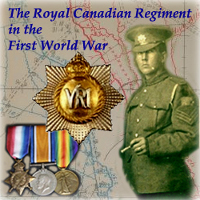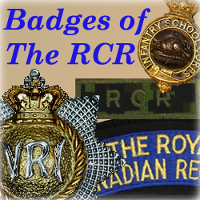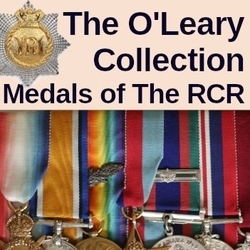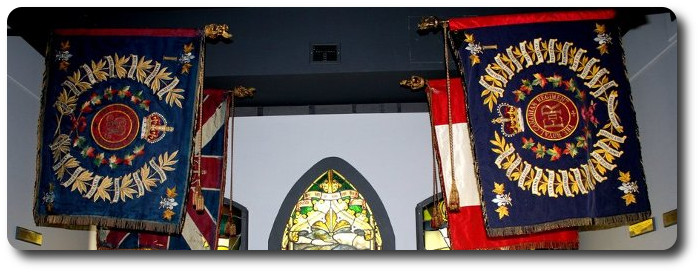
Researching The Royal Canadian Regiment
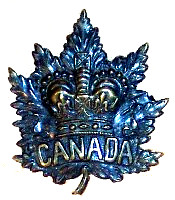
Badge worn by the Second (Special Service) Battalion of The Royal Canadian Regiment while serving in the South African War; 1899-1900.
First Impressions Under Fire
By: Gerald Cadogan
Reproduced from The Connecting File, 1966
Editor's Note: In 1902, under the pseudonym of "Gerald Cadogan", Pte R.R. Thompson, who won the Queen's Scarf of Honour for his actions on 18 and 27 February 1900, committed some of his impressions of the Boer War to paper in the form of short stories and a poem.
What did I feel like as I crept into the firing line for the first time?—I don't think I felt frightened, but I was aware of a rather peculiar sensation, as if someone were applying a block of ice to my spinal column. Peculiar noises filled the air—now resembling a hiss, now a crack of a whip—then as if all hell was let loose around my ears as a shell burst in my vicinity, now on the left a spitting noise denoting the maxim at play.
When at College my professor used to try and impress upon my rather dull brain—that the atmosphere contained the gases Nitrogen and Oxygen together with, and here he would smile—the fumes of tobacco and strong drink—according to the locality. All I know was—that that morning the humid air reeked with lead and death.
As we crept nearer the firing line I became aware of the fact that I was trying to dodge the unseen bullets that were whistling past my ears by jerking my head from side to side. Suddenly a voice on my right was heard singing:—
"When you're first under fire and you're wishful to duck
Don't look nor take heed to the man that is stuck
Be thankful you're living and trust to your luck
And go to your God like a soldier."
Unconsciously I joined in the refrain and we advanced steadily on until at last we were ordered to lie down and open fire.
The Boers lay on our front some 500 yds away—in the river bed—along the banks of which were a long line of bushes and trees extending for miles, affording most excellent cover.
We lay in the open exposed to a most galling fire—and without cover of any sort.
There is a rather popular fallacy at the present day—that there can be no fire without smoke—I only wish the philosopher who was responsible for that maxim could have been with me that morning and he would have changed his mind—as there was no smoke in the region of those trees, but the fire that issued from them was the hottest I ever wish to be in the vicinity of.
As a bullet splashed the brain out of a young Canadian lad along side of me—I suddenly began to wonder where I would be hit—but I was interrupted by the voice of the never to be forgotten Andy Laird who lay some five yards away to my left rear exclaiming, "Damn the luck—I lost all my money at Belmont backing "two spots" at "Banker" and then I footslog it one hundred miles to get a rap at John Boer—only to get plugged in the fat of the leg the minute I try to raise my sight—it's just like my damned luck, but I've got him dead" he says as he fixes his back sight to 650 yards and taking deliberate aim at a tree stump some distance away—pulls the trigger and the report of his rifle is accompanied by a howl of joy—"By the holy red rod of Aaron, I've got him—I think I'll bandage my unfortunate leg now"—which he does to the tune of—"She was bred in old Kentucky".
Ah ! ! ! a close call that—as I wipe some of the sand out of my eyes—and a Mauser bullet buries itself in the loose sand a few inches from my chin—and I grip my rifle—as the only thing to be cherished—the atmosphere in front of me has turned a livid red—have you ever witnessed that extraordinary phenomenon, God grant you never will—the lust of vengeance took possession of my being—I longed to kill—and almost as the thought came—my rifle spoke for the first time—and the bullet sped on its way—accompanied by my heartfelt wish—I hope you will find a berth in the fatty part of some Boers anatomy, and almost as an answer a bullet zipped past my ear and poor Findlay had gone to his God with a bullet through his heart—only one desire took possession of .me and that was to kill someone or something—an unfortunate milk cow at that moment wandered right across the Boer lines. I dropped it, as Andy Laird would say, "like a pig would a hot potato."
After all, what was there to fire at—I remember the order as we opened fire—not at the enemy mind you—but at the line of trees in front at six hundred yds commence firing—yes a paltry five hundred yds separated us from the enemy but I am prepared to swear on a stack of bibles—that I lay for five hours firing at those blessed trees without ever seeing a Boer—waste of ammunition I hear you say—perhaps—perhaps not—as we afterwards found out the Boer trenches lay right under those very trees. More ammunition this way old man—and a lad rushes up—with 40 or 50 packages in his arms, chucking one here and one there—making a witty remark as he does so—he belongs to D Company of the Royal Canadians, I think his name is Jackson—"lets have five or six packages more"—shouts Laird, "you needn't be so damn stingy about them—and I've got a bad leg to compensate them for yet"—"the devil another package you'll get Andy—aye think you're a blooming CIV (City Imperial Volunteers) maxim gun, and he rushes back to the ammunition line for more.
The decoration has not yet been stamped that's fit to decorate his breast—it's not made with hands and as he lies under the Modder's Banks sleeping his last sleep—the hearts of D Company and those of the Canadian people lie with him. My ammunition has at last given out—in one way I am not sorry as my shoulder is decidedly painful—there are some people who will tell you a Lee Enfield doesn't kick—with all due apologies to its talented inventor if he should have any doubts on the subject—to him I will say lie down on the sun scorched veldt and fire 300 rounds without using a pull through—and you will afterwards wonder how you came through the ordeal alive— \why not have a pull through—you ask—No thank you—you might do so once but you'd have a kind of tired feeling in one of your arms after it—I saw a chap doing it, he was one of the best rifle shots in Canada, but somehow I don't think he will ever fire another one—his right forearm was smashed to atoms by an explosive bullet in the act of so doing.
Being of no further use—my last round having been expended, I lay face downwards on the burning veldt and heedless of the bullets that splashed here, there, and everywhere and conscious of the fact that for 36 hours I had nothing to eat and had marched 33 miles and fought for 13 hours during that time—I fell asleep.
My slumber did not last long—and they were not pure and light as the Hymnal is wont to express it—I had a rude awakening—the butt of a Lee Enfield rifle in your ribs in no way resembles the tap of the housemaid on your bedroom door—"saying wake up sir its half past eight"—No—poor old Ollie .Burns' jab in the ribs was anything but a gentle reminder that I had been slumbering—I awoke with a word upon my lips which is not to be found in an English dictionary—only to hear a voice clear as a church bell shouting "Canadians and Cornwalls will fix bayonets and prepare to charge"—one wild cheer and the bayonet, slipped on with a click—"Charge" ! ! ! and as the line jumped up as one man—a solitary figure jumped out in front with a clear five yards lead—Good old Aldworth—he had no chicken hearted boys behind him that day as he shouted—"£5 to the first man into the Boer trenches". A Canadian lad shot past him like a greyhound lopes by a fox terrier shouting—"come on Canada"—(we picked him up next morning with his body riddled with bullets in one of the advanced trenches) but the gallant leader of the Cornwalls all but held his own. What a jumble—a Canadian on my left, a Cornwall on my right, what the devil regiment does that man in front shouting like a demon "Charge—ye sons of guns" come from—I recognize it now—as he falls in front of me—Shropshire—but how have they come to be here—no time to think they are there that's all—"we're up against the real thing now" sings poor Ollie Burns, up go his arms and he falls with a bullet through his brain, and we stumble—next Charlie Clarke goes down with four or five bullets—exclaiming, "I think I've taken an overdose of lead this time"—rip a bullet tears through my helmet and as I unconsciously duck, down goes the gallant leader of the Cornwalls—without a moan—who is that racing by my side, shouting "The Maple Leaf Forever" and as he runs snatches up a rifle from a Canadian who has fallen in front of him—as I live—Jackson the ammunition bearer—"what the devil are you doing here"—I ejaculate—"I wouldn't have missed this for a fortune"—another man drops in front and Jackson stumbles over him—now we are in for it and no mistake—crossfire everywhere, the Boers are only 100 yds from us now but there is a solid wall of lead between us and them—the hail of lead is pouring in on us from every side—"there goes the Adjutant of the Cornwalls"—shouts Jackson as another figure drops to the earth on my right—on still on—we have breathing space now there are long serried lanes, in Our ranks men are dropping on every side—hundreds of dead or dying in our wake and hundreds more must die before those trenches are reached—but no its impossible—no human being can move against that hail of lead—someone shouts "retire"—"the devil a retire" shouts Jackson back—and even as he does a bullet silences him forever—hundreds of Boer jump up some 80 yards in front t firing as fast as they can load—men are falling in heaps everywhere—broken spirited—broken hearted—all that is left of them—those that went into that charge with a smile on their face and a cheer on their lips—watch them now as they stumble back recognizing every foot of the way a comrade dead or dying, who a few short moments ago was full of life—still the awful carnage goes on, and as I stumble blindly back the bullets falling like rain—a voice on my left exclaims "Goodbye Irish" and as I grasp a second later his hand, poor old Gerald Corbett drops dead with a moan.
More men are falling now than ever—God of heaven what a sight—watch those in front as they fall shot through the back—where have they all come from—Canadians, Cornwalls, Shropshire, Black Watch, all lie dead or dying side by side—where are the five or six hundred now that jumped up to take part in that charge—there's not two hundred left—where are the dear old chums I had by my side a few short minutes ago—Charlie Clarke—Red River Jackson—Zack Lewis—Billy Bradshaw—not one left now. I am all alone, the nearest man to me being some ten yards away staggering back with a bullet in his leg—the shades of evening are falling fast the groans of the dead and dying fill the air—where is the army that we left on the field a short time ago—not so quick, what's that—away on the left—they are falling back on the camp of the morning some two miles away and as the last few sputters of the rifles from the Boer trenches denotes—that the charge has been repulsed, and that the best blood of Canadian manhood has been shed together with that of Cornwall, yet at the same time betokens that shoulder to shoulder, Canada and Cornwall had that day written a page in the History of the World with the blood of her sons—which time itself shall never be able to eradicate, and which armchair critics at home will pass by without censure—and now the last Boer rifle has spoken, and a pale moon is shedding its soft light over that awful field—and being worn out I stumble towards a friendly antheap, and flinging myself on the sandy veldt, I am soon asleep.
